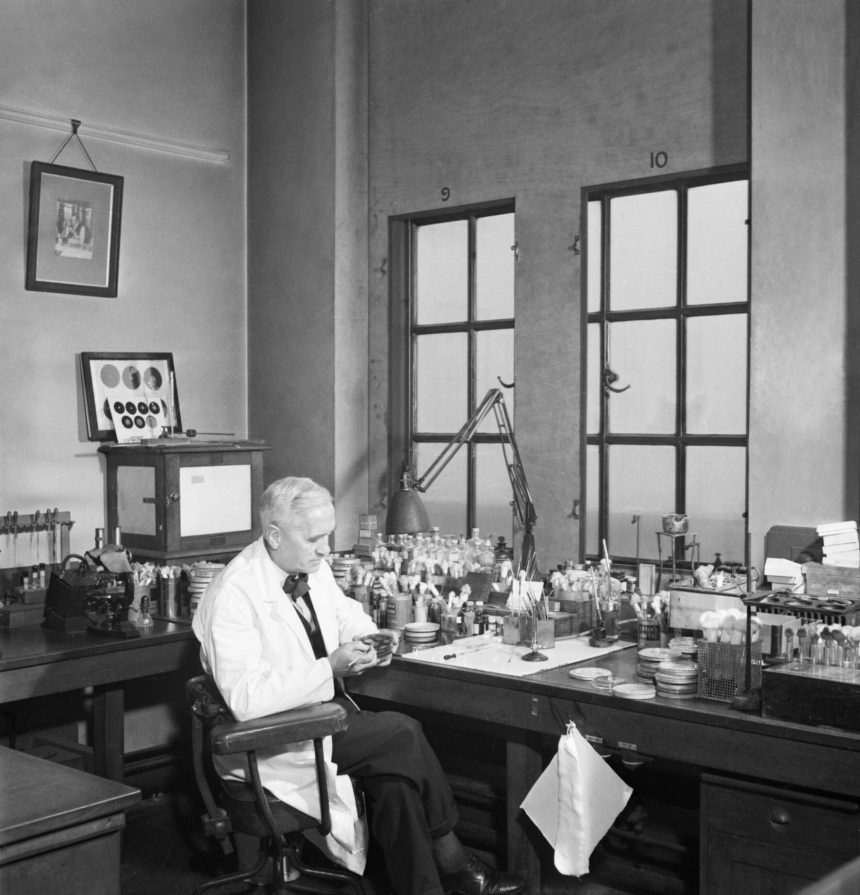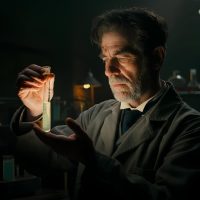Scottish physician and microbiologist Sir Alexander Fleming is known for being the author of one of the greatest – if not the greatest – discoveries in medicine: penicillin, the first antibiotic in history. For this feat, he won a Nobel Prize in Medicine and the title of Knight of the British Crown, among other honors. He is also considered one of the greatest scientists of all time.
Born on August 6, 1881, on a farm in Ayrshire county, Scotland, Fleming began his academic career in 1903 at the medical school of St. Mary’s Hospital in London. He graduated as a doctor, surgeon, and bacteriologist.
He served as a doctor in World War I, where he saw the destructive action of infections caused by bullet wounds in soldiers – which would inspire him to seek a way to kill bacteria. He died on March 11, 1955, in London, victim of a heart attack.
Here are five facts about Alexander Fleming’s career and discoveries:
- A Scientist at War
Graduated since 1908 as a doctor, surgeon, and bacteriologist, Fleming made his first major discovery during World War I. In a field hospital on the Western Front in France, he observed that many shot soldiers died of septicemia. And worse: the antiseptics used on wounds seemed to worsen the situation.
In an article published in The Lancet in 1917, while the war was still ongoing, he described the reason for this effect: the antiseptics had a good bactericidal action on the wound surface but removed the body’s defenses against germs. As a result, the deeper bacteria gained space to infect the severely wounded areas.
- First Major Discovery
After the war, Fleming persevered in the search for a medication that would alleviate the agony of infection victims. In the laboratory, he was known for being a scientist careless with hygiene, to the point that his Petri dishes frequently suffered from unexpected growth of bacterial colonies.
One day in 1921, he decided to apply nasal mucus to one of these plates contaminated by airborne bacteria. And he noticed that the secretion killed the microorganisms. This casual revelation led to the subsequent discovery of lysozyme, an enzyme with antimicrobial action present in secretions such as mucus, tears, and saliva.
- The Mold That Saved Lives
Fleming’s ability to observe and intuit accidental discoveries led him to be the author of what many consider the greatest revolution in medicine. In 1928, his research focused on staphylococcus bacteria, grown in Petri dishes.
On September 3, upon returning to work after spending a holiday with his family, he noticed that the culture was contaminated by mold – and that the colonies that were close to the fungi were dead, unlike those more distant.
Later he identified the fungus as Penicillium rubens, which would lead to the creation of penicillin, the first antibiotic in history.
- Joint Nobel Prize
Announced by Fleming on February 13, 1929, penicillin did not impress the scientific community of the time. In fact, the discovery went more than a decade without receiving the recognition it deserved. The reason was that no practical application of the substance was seen, as no way to isolate it and produce it as a medication had been presented.
This only happened in 1940, when biochemists Ernst Boris Chain, Howard Florey, and Norman Heatley published a study presenting the structure of penicillin and developed a method to purify and stabilize the component, enabling mass production. In 1945, Fleming, Chain, and Florey were awarded the Nobel Prize in Medicine.
- At the Center of Two Fake News Stories
Two British urban legends involve the names of Alexander Fleming and Winston Churchill, Prime Minister of England between 1940 and 1945 and from 1951 to 1955. The first is that Fleming’s studies were sponsored by Churchill’s father because Alexander’s father had saved young Winston from drowning in a swamp.
The other, published by newspapers of the time, claimed that Fleming saved Churchill with penicillin when the Prime Minister contracted an infection in Tunisia in 1943. In fact, the premier was treated by the official doctor, Lord Moran, who applied a sulfonamide-based medicine, another recently discovered antibiotic substance at the time.









